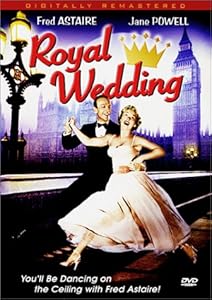 I have been noting with something approaching bemusement the hoo-hah regarding the Royal Nuptials so recently concluded in the wee hours (PDT) of this morning, and trying to figure out what all the fuss is here in the US. Facebook is rife with commentary and comedy. I have seen several statuses asking the question, "What's your Royal Wedding name?", inviting friends to combine the names of dead relatives with dead pets and street names to come up with a high-falutin name worthy of, ahem... Will and Kate's guest-list. The wife of one of my friends hosted a party to which the guests wore their wedding gowns to watch the event together.
I have been noting with something approaching bemusement the hoo-hah regarding the Royal Nuptials so recently concluded in the wee hours (PDT) of this morning, and trying to figure out what all the fuss is here in the US. Facebook is rife with commentary and comedy. I have seen several statuses asking the question, "What's your Royal Wedding name?", inviting friends to combine the names of dead relatives with dead pets and street names to come up with a high-falutin name worthy of, ahem... Will and Kate's guest-list. The wife of one of my friends hosted a party to which the guests wore their wedding gowns to watch the event together.I have been pondering all of this and have concluded that the Royal Wedding is much like St. Patrick's Day, during which, of course, everyone is Irish. In the same way, for the Royal Wedding, we are all loyal subjects of the Crown of England, cheering on the new Prince and Princess William, Duke of Cambridge with all vigor and stiff upper lips and whatnot. Of course, we pay no attention to the conflict this must set up within us as good Irish (that was so last month)!
Now, don't get me wrong; they seem to be a sweet couple, and I pray them a long and loving marriage in defiance of the statistical odds, and the tragedies of less recent royal marriages. And we all love pageantry, don't we? I mean, look at how we dress up our children for preschool "graduations" these days? We seem starved for pomp and circumstance.
But the question arises for me, and I wonder that it doesn't for every American: Didn't we undertake a war 235 years ago in defiance of the notion of being subject to the Crown? I seem to recall that some very smart and sincere men penned a little document called the Declaration of Independence, wherein some words were written about being "Absolved from all Allegiance to the British Crown." I know this because I spent a great deal of time as a child memorizing the dialogue from Stan Freberg Presents The United States of America Part One: The Early Years, wherein Tom Jefferson attempts to get Ben Franklin to sign off on the document before the 4th of July holiday ("You're so skittish! Who possibly could care if you do?" "The Un-British Activities Committee, that's who!"). I mean, what else are you going to do when you're 15 and you are imprisoned in a one-room cabin for weeks on end when you hate fishing and the only other things you have to entertain you are a .22 rifle and the Big Stinky Fly Trap?
So I'm trying to figure out this fascination with the Royals when it occurs to me: we, even those of us steeped in Independent America, are longing for a King. We mostly don't even realize it, because we have so long drunk at the tap of Independence that we think we are quenching our thirst for fountains of Living Water, when all we are doing, really, is sipping from a muddy cup. I am proud to be an American. I believe America was formed from the embodiment of good and godly principles of Christian faith. I believe we have done some of the greatest good a nation can possibly do throughout our short history. But I believe there is Someone larger than the United States of America to Whom I owe my fullest allegiance, and even my very life.
We are in the midst of celebrating the Resurrection of this King, and our resurrection with Him, who follow Him. He is the true King of all kings, the Real Royal of which all earthly royals are but types and shadows. He is the King we long for, even though we may not know it, even though we deny it; somewhere within us we know we need Him, and we desire to be subjects of His Kingdom. This is what we are created for; this is our deepest and most magnificent Obsession. And under His reign, we ourselves, simple independent commoners, become royals. A blessed Eastertide to all.








